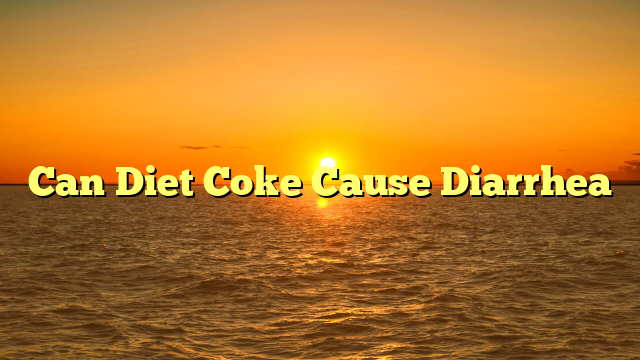Can Diet Coke Cause Diarrhea
Have you ever wondered if your favorite fizzy drink could be the culprit behind your sudden bouts of diarrhea? In this informative article, we explore the potential connection between diet coke and this uncomfortable digestive issue. As we delve into the subject, you’ll discover the facts and insights that will help you make informed decisions about your beverage choices and take control of your overall health. So, grab a refreshing glass of water and let’s find out if diet coke can indeed cause diarrhea.
Overview
Diet Coke is a popular beverage choice for many individuals who are looking to reduce their calorie intake or avoid consuming regular Coke with added sugars. However, there have been claims suggesting that consuming Diet Coke may contribute to diarrhea. In this article, we will explore the potential link between Diet Coke and diarrhea, examining the ingredients in Diet Coke, potential causes of diarrhea, relevant scientific studies, individual sensitivities, and the potential effects on gut health. We will also provide recommendations for individuals who experience diarrhea after consuming Diet Coke.
Definition of Diet Coke
Diet Coke is a sugar-free carbonated beverage manufactured by The Coca-Cola Company. It was introduced in the United States in 1982 as a response to the growing demand for low-calorie drinks. Diet Coke is marketed as a healthier alternative to regular Coke due to its absence of added sugars, making it a popular choice among individuals who are conscious of their sugar intake.
Definition of Diarrhea
Diarrhea is a common digestive condition characterized by frequent loose, watery bowel movements. It can be caused by various factors, such as viral or bacterial infections, food intolerances, gastrointestinal disorders, or dietary changes. Diarrhea can be uncomfortable and disruptive to daily life, often causing dehydration and nutrient deficiencies if not managed properly.
Ingredients in Diet Coke
Artificial Sweeteners
One of the key ingredients in Diet Coke is artificial sweeteners, such as aspartame, sucralose, and acesulfame potassium. These sweeteners provide the soda with its sweet taste without adding calories from sugar. While approved by regulatory bodies as safe for consumption, some individuals may experience gastrointestinal discomfort or digestive disturbances after consuming products containing artificial sweeteners.
Caffeine
Diet Coke also contains caffeine, a stimulant that is naturally found in coffee, tea, and some other beverages. Caffeine acts as a mild diuretic, stimulating the kidneys to produce more urine. In some cases, excessive caffeine intake can lead to increased bowel movements, potentially contributing to diarrhea.
Carbonation
The carbonation in Diet Coke is achieved by dissolving carbon dioxide gas under pressure, creating bubbles or fizz. While carbonation itself is not typically a direct cause of diarrhea, it can contribute to feelings of bloating or gas, which some individuals may associate with digestive discomfort.
Preservatives
Diet Coke contains various preservatives, such as potassium benzoate and potassium sorbate, which help extend its shelf life by inhibiting the growth of bacteria, yeast, and mold. However, preservatives are generally considered safe for consumption and are unlikely to be a direct cause of diarrhea.
Potential Causes of Diarrhea
Food Intolerances
For some individuals, certain ingredients in Diet Coke may trigger food intolerances, leading to digestive symptoms, including diarrhea. Common food intolerances include lactose intolerance (inability to digest lactose, a sugar found in milk), gluten intolerance (celiac disease or non-celiac gluten sensitivity), or sensitivity to specific food additives.
Artificial Sweeteners and Gastrointestinal Discomfort
While artificial sweeteners are generally recognized as safe, some individuals may experience gastrointestinal discomfort, including diarrhea, after consuming products containing these sweeteners. This can be due to individual variations in how these substances are metabolized or the impact they have on gut bacteria.
Caffeine and Bowel Movements
Caffeine is a known stimulant of the central nervous system and can affect gastrointestinal motility. It may increase the contractions of the colon, potentially leading to more frequent bowel movements. In sensitive individuals, excessive caffeine intake, such as from Diet Coke consumption, may contribute to diarrhea.
Carbonation and Digestive Issues
Although carbonation itself is not typically linked to diarrhea, it can contribute to feelings of bloating or gas. Some individuals may experience discomfort or digestive disturbances after consuming carbonated beverages, including Diet Coke. These symptoms may be more pronounced in individuals with pre-existing digestive conditions, such as irritable bowel syndrome (IBS).
Scientific Studies
Study 1: Effects of Artificial Sweeteners on the Gut
A study published in the journal “Gut Microbes” in 2018 investigated the effects of artificial sweeteners on the gut microbiome. The researchers found that artificial sweeteners, including those found in Diet Coke, may alter the composition and diversity of gut bacteria. While this study did not specifically examine the link between Diet Coke and diarrhea, it suggests that artificial sweeteners could potentially impact gastrointestinal health.
Study 2: Caffeine and Gastrointestinal Disturbances
Another study published in the “World Journal of Gastroenterology” in 2017 explored the relationship between caffeine intake and gastrointestinal disturbances. The researchers found that high caffeine intake was associated with increased bowel movements and gastrointestinal symptoms, including diarrhea. While this study did not focus specifically on Diet Coke, it provides insight into the potential role of caffeine in contributing to diarrhea.
Study 3: Carbonation and Digestive Problems
A study published in the journal “Nutrients” in 2016 investigated the effects of carbonated beverages on digestive symptoms, including bloating and flatulence. The researchers found that carbonated beverages, including those with artificial sweeteners, may contribute to digestive issues in sensitive individuals. However, more research is needed to understand the specific mechanisms and individual variability.
Individual Sensitivities
Varied Reactions to Diet Coke
It is important to note that individuals can react differently to the consumption of Diet Coke. While some individuals may experience no adverse effects, others may experience various digestive symptoms, including diarrhea. These individual differences can be influenced by factors such as genetic predisposition, overall gut health, and underlying medical conditions.
Personal Factors and Diarrhea
In addition to the ingredients in Diet Coke, individual factors can contribute to diarrhea. Personal factors, such as stress, anxiety, travel, or recent illness, can affect the digestive system and potentially increase the likelihood of experiencing diarrhea. It is essential to consider these factors when assessing the potential link between Diet Coke and diarrhea.
Potential Effects on Gut Health
Alteration of Gut Microbiome
The consumption of diet beverages, including Diet Coke, has been implicated in potentially altering the composition and diversity of the gut microbiome. The gut microbiome plays a crucial role in supporting overall gut health, digestion, and immune function. Disruptions to the gut microbiome can contribute to various gastrointestinal symptoms, including diarrhea.
Inflammation and Digestive Issues
Some ingredients in Diet Coke, such as artificial sweeteners, have been associated with low-grade inflammation in the gut. Chronic inflammation in the gastrointestinal tract can disrupt normal digestive processes and potentially contribute to diarrhea. However, further research is needed to fully understand the relationship between Diet Coke consumption, gut inflammation, and diarrhea.
Recommendations for Individuals
Monitor Personal Reactions
If you experience diarrhea or other digestive symptoms after consuming Diet Coke, it may be helpful to monitor your personal reactions. Keep a food diary to track your beverage and food intake, as well as any symptoms experienced. This can provide valuable information to identify potential triggers and make informed decisions about your dietary choices.
Consult a Healthcare Professional
If you are consistently experiencing diarrhea or other concerning digestive symptoms after consuming Diet Coke or other diet beverages, it is advisable to consult a healthcare professional. They can assess your individual health history, conduct appropriate tests if necessary, and provide personalized advice to help manage your symptoms and ensure optimal gut health.
Conclusion
While there are claims suggesting a potential link between Diet Coke and diarrhea, the research is still limited and inconclusive. Various factors, such as individual sensitivities, artificial sweeteners, caffeine, and carbonation, may contribute to digestive symptoms, including diarrhea, after consuming Diet Coke. However, it is important to note that individual reactions can vary, and not everyone will experience these effects. Monitoring personal reactions, considering individual sensitivities, and consulting a healthcare professional can help individuals determine the best course of action for their gut health. Remember, it’s always essential to listen to your body and make choices that support your overall well-being.











